Iranian Artists’ Cannes Tribute To Hanged Protesters
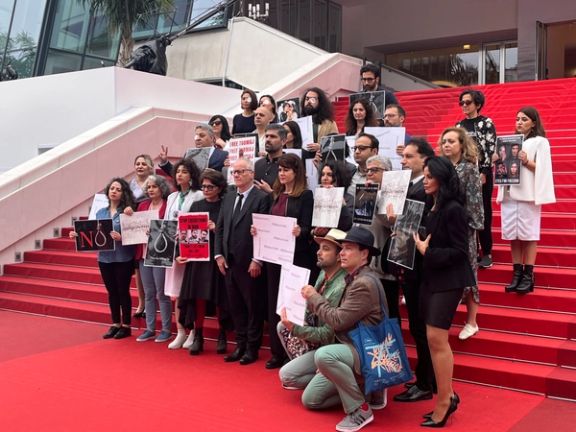
Iranian artists at the Cannes Film Festival have held a protest over the Islamic Republic’s execution spree.

Iranian artists at the Cannes Film Festival have held a protest over the Islamic Republic’s execution spree.
On the fifth day of the festival, Iranian filmmakers displayed images of three protestors who were recently hanged in Esfahan (Isfahan).
Majid Kazemi, Saeed Yaghoubi and Saleh Mirhashemi were executed on Friday over the death of two IRGC’s Basij militia members and a police officer in protests of November last year, in what Persian media have dubbed the ‘Esfahan (Isfahan) House’ case.
The participants kept silent for a minute to pay respect to the hanged protesters.
Zar Amirabrahimi, a well-known actor, Kaveh Farnam, a producer, Sepideh Farsi and Milad Alami, directors, Asal Bagheri, a researcher, and Sahar Bagheri, one of the managers of the French department of Amazon Company, took part.
They talked about the current conditions of Iranian cinema, censorship, the impact of recent protests on Iranian filmmakers, and the conditions of filmmakers outside Iran to express the untold narratives of Iran in their works.
Referring to the current situation in Iran, the cinematographers also discussed the difficulties of making films in accordance with the current reality in Iran and passing through censorship. They called for the support of the cinema world and events such as the Cannes Festival to consider the plight of Iranian filmmakers.
The 76th Cannes Film Festival began on May 16 and will end on May 27.
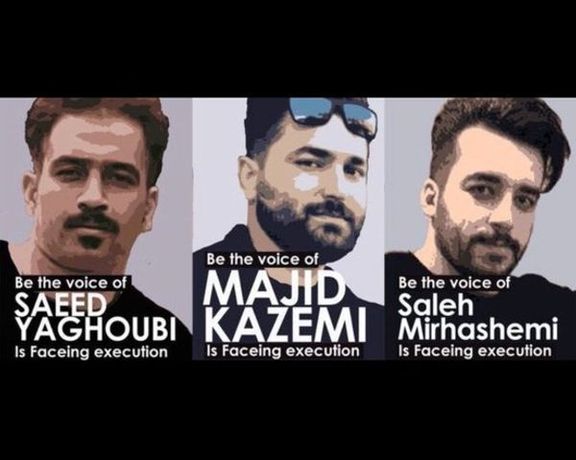
Iranian regime agents have attacked the family of a recently executed protestor in their home.
Security personnel assaulted the brothers and parents of Majid Kazemi, and carried out two arrests.
A cousin, Mohammad Hashed said in a tweet Sunday that the agents arrested two brothers of Majid while they were severely injured.
Hashemi said: After a few hours, while Majid's sister was following up on their status, they returned and arrested his sister too.”
Majid Kazemi, Saeed Yaghoubi and Saleh Mirhashemi were convicted over the death of two IRGC’s Basij militia members and a police officer in protests of November last year, in what Persian media have dubbed the ‘Esfahan (Isfahan) House’ case.
The judiciary announced their execution in a statement on Twitter Friday morning, bringing to at least seven the number of protesters hanged since nationwide protests broke out in September 2022 following the death in custody of 22-year-old Mahsa Amini.
The three were handed down the death sentence in a trial condemned as a travesty of justice by human rights campaigners, who say the prisoners were tortured into confessions, and there is no reliable evidence against them.
Over the past few days, a large number of foreign officials and human rights activists had called on the Islamic Republic to stop the executions.
So far, around 500 civilians have been killed by security forces and at least 20,000 arrested. While many have been released, around 1,500 face criminal charges, and at least 80 detainees face the death sentence.
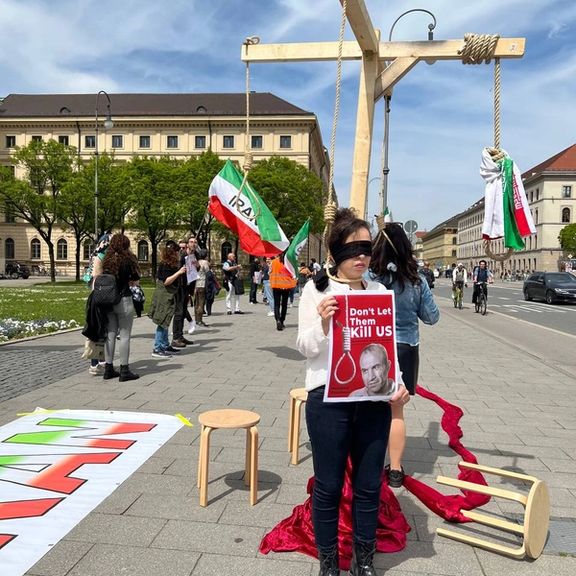
Iranians at home and abroad staged protests Saturday against the Islamic Republic execution spree, the latest victims of which were three people hanged Friday.
The gathering of protesters started in Australia and New Zealand and continued until Saturday evening in dozens of other cities in Sweden, Denmark, Germany, Norway, Finland, Holland, Austria, among many others. Cities in the western parts of the US and Canada were the last where people held rallies.
Iranians are outraged and frustrated over the hangings; frustrated that protest gatherings outside the prison where they were held failed to halt the executions and outraged that calls by the international community did not stop the Islamic Republic's execution machine.
During rallies in Norway, Masud Gharahkhani, the Iranian born politician who heads the Norwegian parliament, sent a video message to protesters in the Swedish city of Gothenburg, saying, "In Iran, young people are imprisoned and executed, journalists do not have freedom and security, and the country's oil money is not spent for the people, but wasted on corruption.”
Alireza Akhondi, Swedish-Iranian member of the Swedish parliament, told Iran International during the rallies that the gathering of expatriates around the globe in the past few months prompted several resolutions in Western against the Islamic Republic.
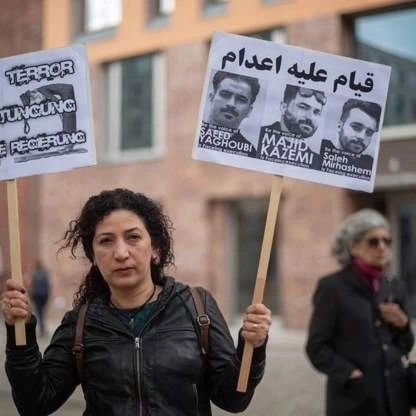
The rallies were planned before the regime hanged Majid Kazemi, Saeed Yaghoubi and Saleh Mirhashemi Friday morning over trumped up charges after extracting forced confessions, in a case described as a travesty of justice. Human rights campaigners say they were tortured into confessions, and there was no reliable evidence against them.
They were convicted over the death of two IRGC’s Basij militia members and a police officer during protests in November last year, in what Persian media have dubbed the ‘Esfahan (Isfahan) House’ case. The three had been arrested in an Esfahan (Isfahan) neighborhood called “Esfahan House,” thus the name of the case.
Leaked audio from police radio chatter from the night the three regime agents were killed indicates that they were killed by friendly fire of plainclothes forces. The victims had even alibis for the time the agents were killed, with the family of one of the victims saying there is CCTV video footage of their son at work.
In reaction to the “grossly unfair trial that bore no resemblance to meaningful judicial proceedings,” Diana Eltahawy, Amnesty International’s Deputy Director for the Middle East and North Africa, said on Saturday, “These executions are designed by the Iranian authorities to send a strong message to the world and the people of Iran that they will stop at nothing to crush and punish dissent. In the absence of a robust international response, the authorities will continue to revel, unabated, in their impunity with lethal consequences for people in Iran.”
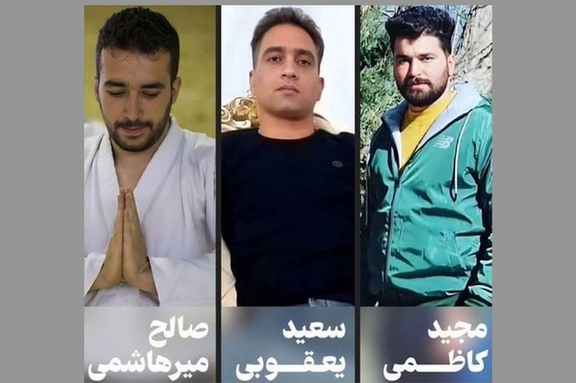
“Governments must urgently denounce these executions, in the strongest possible terms, through public statements and demarches. However, in the face of the Iranian authorities’ unrelenting use of the death penalty, this is not enough. People in Iran don’t have the luxury of time – they are being arbitrarily deprived of their lives at a horrific rate under the guise of judicial executions,” she said, urging all states “to exercise universal jurisdiction over all Iranian officials against whom there is sufficient admissible evidence of criminal responsibility for torture and other crimes under international law.”
Several neighborhoods in the capital Tehran and in Esfahan as well in a few other cities were scenes of protests against the regime’s executions. Students at universities across Iran also staged demonstrations.
Three more prisoners were executed for drug-related offences on Saturday as protesting families were shot at and tear-gassed outside the jail.
Friday's executions brought to at least seven the number of protesters hanged since the beginning of the nationwide protests last September, which turned into one of the boldest challenges to the clerical rulers since the 1979 revolution. The protests were ignited by Mahsa Amini's death in the custody of Iran's morality police.
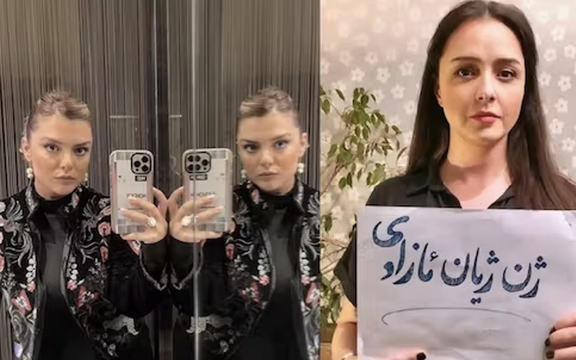
Actresses who remove hijab in Iran face a ban from performances of up to year under a new bill.
Measures already in place to punish female artists and athletes will be worsened by the legislation now going through parliament, news daily Entekhab reports.
A government spokesperson said the bill proposed by the Judiciary regarding hijab was reviewed and approved by the government and sent to the legislature last week.
The penalty will be a ban from all cultural activities for at least three months and up to a maximum of a year.
Even when anonymous, women found to have transgressed rules over the removal of veil, nudity and wearing thin clothes can now be identified through smart technology.
Those found guilty will initially be warned and fined up to three times, and in case of repeating the crime for the fourth time, they will be referred to the judicial authority.
If the hijab is removed in a car, after two warnings and a fine, the vehicle will be stopped for seven days. Civil servants working at state organizations will be prosecuted through the supervisory mechanisms up to three times, and the hijab remover finally will be referred to the judicial authorities.
Four decades after the Islamic Republic forced women to wear headscarves, long tunics and trousers, or the long black veil called chador, women are increasingly appearing in public in regular clothing such as colorful dresses and with no headscarf covering their hair.
A survey carried out by the ministry of Islamic guidance in 2015 showed that more than 70 percent of Iranians did not agree with compulsory hijab.
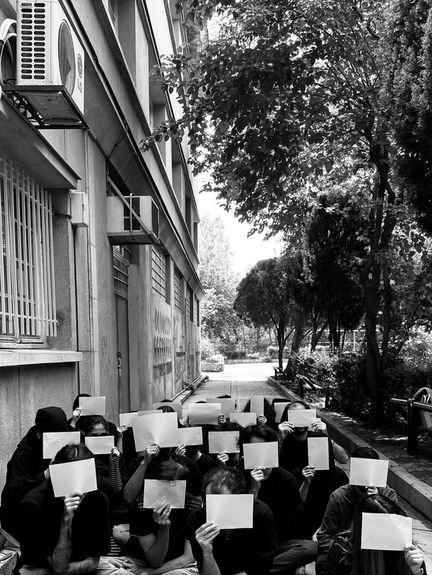
Students at universities across Iran have staged demonstrations over the execution of three political prisoners.
The protests on Saturday follow the hanging a day earlier of Saeed Yaqoubi, Saleh Mirhashmi and Majid Kazemi by the regime.
Wearing black in mourning for the three men, students at Beheshti, Modarres and Zanjan Universities gathered on campus in protest.
The executions on charges of killing two members of the Basij paramilitary force and a police officer came after a trial described as a travesty of justice by human rights campaigners.
The gathering in Beheshti university took place despite police threatening to arrest one of the students in a phone call.
Activists say the security agents "physically confronted” students, even beating them up. Members of the security forces attacked female students, forcibly removing their masks so they could be identified.
Defiant protestors chanted “Death to the Dictator”, and “Woman, Freedom, Life”.
Students at Zanjan and Modarres universities also staged sit-ins, wearing black clothes and chanting anti-regime slogans.
Friday's executions brought to at least seven the number of protesters hanged since nationwide protests broke out last September, in one of the greatest challenges to the Islamic Republic since the 1979 revolution.
The protests were initially sparked by the death of 22-year-old Mahsa Amini in the custody of Iran's morality police.
Opposition rallies have been held outside the prisons where the executions have been taking place, while the international community has voiced its outrage over the breaches of human rights.
However, nothing seems to be stopping the Islamic Republic regime in its tracks as it continues on its killing spree in an attempt to squash political opposition through terror.
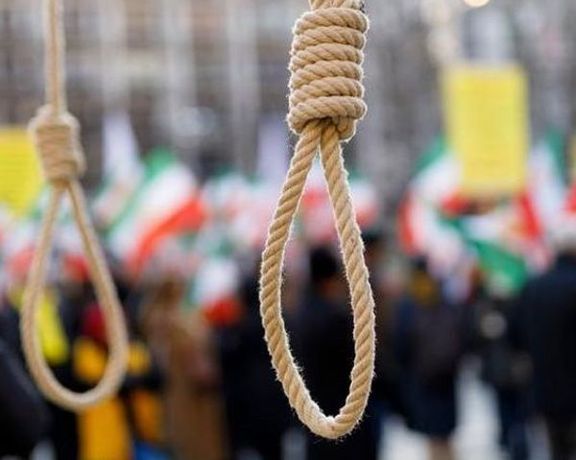
Three prisoners were executed for drug-related offences in Iran as protesting families were shot and tear-gassed outside the jail.
Saeed Garavand, Samad Garavand and Shahab Mansouri Nasab Garavand were hanged Saturday at Ghezel Hesar Prison in Karaj, Kurdish rights group Hengaw reported.
The men, all from Kouhdasht in Lorestan province, were sentenced to death by the judiciary on drug-related charges five years ago.
Families of the prisoners and opponents of the death penalty gathered in front of Ghezel Hesar prison in protest. However, regime forces intervened, using tear gas and shotguns to disperse them.
Hengaw wrote that more than ten protestors, mostly women, were wounded in the head, face, arms, legs, and abdomen.
Hengaw also announced that another man, Asef Shahbakhsh, was hanged in Zahedan prison southeast of Iran also on Saturday, while an alleged human trafficker, Shahrooz Sokhanvari was executed on the same day.
This means at least five prisoners have been executed in Iran on Saturday alone, as the death toll for the Islamic Republic’s execution spree rapidly closes in on 600 for the year so far.
The US-based Human Rights Activists News Agency (HRANA) had announced on Wednesday that Sokhanvari had been transferred to Rajaeeshahr prison in Karaj for the execution, while seven other prisoners were transferred to solitary cells in the Ghezel Hesar prison of Karaj to be hanged.